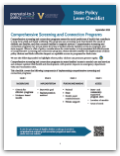Expanding Medicaid coverage to most adults with incomes up to at least 138% of the federal poverty level increases families’ access to needed care and services, reduces financial burdens associated with health care costs, leads to fewer infant and maternal deaths among Hispanic and Black families, and decreases reports of child neglect.
Implementation of Medicaid expansion varies across states. Some states have expanded eligibility to higher income thresholds than those defined in the ACA or to additional populations that are not traditionally covered by Medicaid, while other states have not expanded Medicaid at all.
This State Policy Lever Checklist includes a list of policy considerations for state leaders to help maximize the effectiveness of expanding income eligibility for health insurance. It also underscores the implications of these policy choices and their collective impact on equitable access to health insurance for their state.
This checklist covers the following components of implementing Medicaid expansion and postpartum Medicaid extension:
- Who is covered
- Income eligibility thresholds
- Additional populations




